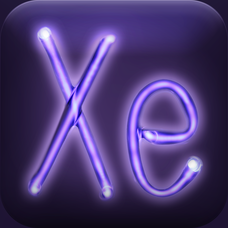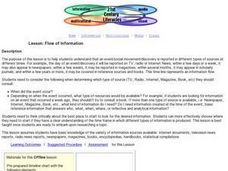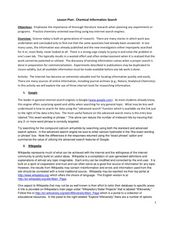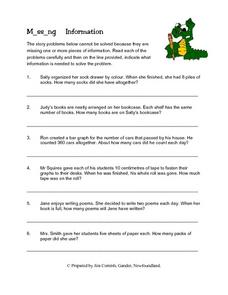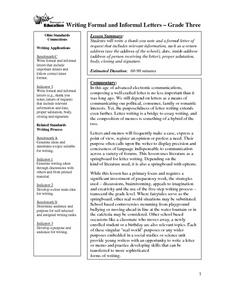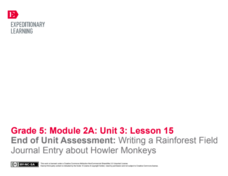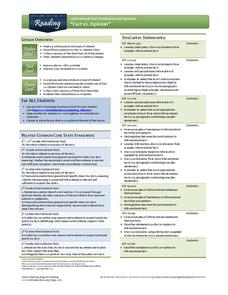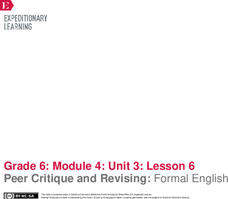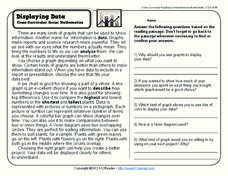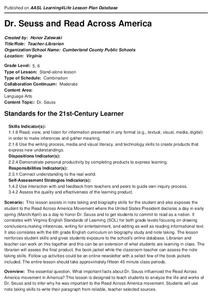Curated OER
The Elements: A Visual Exploration
Have the building blocks of the universe at your fingertips! Visually intriguing and animated, this interactive periodic table may also be the most informative chemistry tool available!
Curated OER
Youth Emergency Preparedness
What is an emergency, why is preparing for one important, and how can your pupils help others prepare for an emergency? Answer these questions and more with a short unit. Learners will participate in a variety of collaborative,...
EngageNY
Writing to Inform: Colonial Trades
Fourth graders who are studying life in colonial America engage in an instructional activity that has them create a "Help Wanted" ad that would have been written by a master craftsperson from back in the day. They utilize a graphic...
Curated OER
Flow of Information
Young scholars examine how information follows a linear path. They identify types of sources they need to consult and where it falls in the information flow, simulate the role of historians, and generate a list of sources for a topic.
Curated OER
Using Information Resources: Lesson 1
Eighth graders examine, brainstorm, cluster, and skim how to use a variety of information resources to assist them in projects or reports. In addition, places to find those information resources as well as the parts of a book is covered...
Curated OER
Introduction to Engineering Information Technology
Students demonstrate knowledge of information sharing skills by discussing each step with their group members. They demonstrate application of information sharing skills by working with a group to share specific pieces of data with...
Curated OER
Communicating through Engineering Information Technology
Students analyze prior labs by keeping a lab notebook. They share their lab notebook by electronically sending it to their classmates. Students demonstrate evaluation of other lab notebooks within the same classroom and those from other...
Curated OER
Chemical Information Search
Students research information using various internet resources. In this chemistry lesson, students demonstrate their ability to navigate websites and gather necessary information. They evaluate the potential usefulness of the databases...
Curated OER
M_ss_ng Information (Missing Information in Word Problems)
In this math worksheet, learners read 6 word problems which cannot be solved because of missing information. Students read each problem, then indicate what information is needed to solve the problem.
Curated OER
Writing Formal and Informal Letters
Third graders write a thank-you note and a formal letter of request that included relevant information, such as a return address, date, inside address, proper salutation, body, closing, and signature. They write an imaginary letter to...
Curated OER
Preparing for the Informative Speech
Students read an outline on how to prepare an informative speech. In this informative speech lesson plan, students read an outline and then prepare a speech.
Curated OER
Too Much Information
In this solving word problems with too much information instructional activity, students read to find the information needed and apply that to solve the problems. Students solve six problems.
Curated OER
Lesson 8: Summarizing Information
In this summarizing information worksheet, students read a featured article, summarize the article, identify the story's five W's and one H, and identify appropriate relevant facts.
Curated OER
Communicating about Our World through Informal Writing
Fifth graders review their writing for repetition of words at the beginning of the sentence. In this informal writing instructional activity, 5th graders share examples of sentence beginnings. Students use a thesaurus to find...
Curated OER
Personal Information: Name, Address, Telephone Number
In this personal information worksheet, students fill in a crossword puzzle as they figure out the answers to eleven clues associated with a persons name, address and telephone number.
EngageNY
End of Unit Assessment: Writing a Rainforest Field Journal Entry about Howler Monkeys
Give me more details. Scholars complete an end of unit assessment by creating an information text box to go with their field journal entries about howler monkeys. Learners use the class time to work independently.
For the Teachers
Fact vs. Opinion
Many informational texts are written as factual, but can your learners determine when an opinion is presented as fact? Have your kids read several articles on the same topic and record the statements that contain either facts or...
EngageNY
Peer Critique and Revising: Formal English
Dear Sir or Madam: What's the difference between formal and informal language? Scholars focus on using formal English and transitions in their position papers. After revising their rough drafts, they engage in the peer editing process...
K12 Reader
Displaying Data
It's important to learn how to display data to make the information easier for people to understand. A reading activity prompts kids to use context clues to answer five comprehension questions after reading several paragraphs about...
Curated OER
Dr. Seuss and Read Across America
What important facts about Dr. Seuss influenced the Read Across America movement...? This is the driving question of a research project that requires scholars to find information about Dr. Seuss' life and work. Class...
Newseum
Can I Trust the Creators?
It's easy to find information at the click of a mouse, but is it trustworthy? Pupils learn about the E.S.C.A.P.E. acronym for evaluating sources. Next, learners read a news story and evaluate its sources to determine credibility. Last,...
Newseum
E.S.C.A.P.E. Junk News
Fair, balanced, and reputable information? There's an acronym for that! Scholars learn the E.S.C.A.P.E. method for evaluating news sources. Then, pupils work in small groups to read and analyze a news story and discuss the activity to...
For the Teachers
Sequence Plot Chart
Your kids can identify the plot sequence of a short story, but what about an informational article? Have them examine the chronological order of events in informational texts with a lesson on the sequence of events.
EngageNY
Researching about the Red Cross: What Is a Multinational Aid Organization?
Lend a helping hand. Pupils read two informational articles about international aid organizations and how they help areas affected by natural disasters. Scholars attempt to uncover the gist of each text, discussing their thoughts in...
Other popular searches
- Informational Text
- Informational Writing
- Geographic Information Systems
- Informal Letter
- Student Information Systems
- Informal Letter Writing
- Informational Text Features
- Informative Writing
- Information Media & Technology
- Informational Text Passages
- Locating Information
- +Student Information Systems


